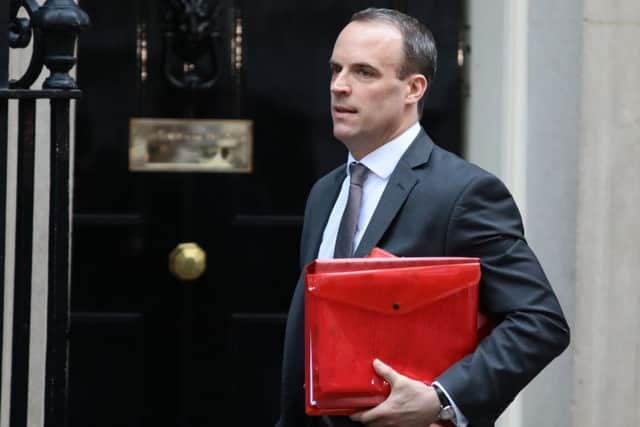Brexit: Where Raab and McVey go wrong over threat to Union '“ Tory MSP
Before the ink was dry on the ballot papers in June 2016, Nicola Sturgeon tied the fate of any second Scottish independence referendum directly to Brexit. Every single week since then, the SNP has tried (and so far failed) to weaponise Brexit, to seek to maximise it to their separatist advantage. The Nationalists do not really care about Britain’s future relations with the European Union — they don’t really care about Britain’s future at all. They want Britain not to have a future. Everything they have said and done about Brexit has been with independence in mind — for them, nothing else matters.
As I write, two senior Ministers have resigned from Theresa May’s Cabinet because they cannot support the draft Withdrawal Agreement published yesterday evening. Both have cited risks to the Union among their reasons for quitting. Dominic Raab and Esther McVey are right to be concerned about the future integrity of the UK post-Brexit — of course they are. But they have jumped the gun, and they have reached conclusions not supported by the evidence.
Advertisement
Hide AdAdvertisement
Hide AdIf the Withdrawal Agreement clearly did pose a manifest danger to the Union, Secretary of State David Mundell would not be supporting it — and neither, for that matter, would the Prime Minister.


What Scottish Unionists understand, even if some others do not always grasp this, is that the Union not only accommodates but requires difference. The United Kingdom is not one-size-fits-all. It is not a unitary state with a single seat of power in which the entire land is ruled in a uniform way. It never has been — and the advent of devolution since 1999 has only increased differences that already existed between the four home nations.
It is inevitable that Brexit will increase these differences further. Many dozens of the powers to be repatriated from Brussels to the United Kingdom when we withdraw from the European Union fall within devolved competence, and will naturally sit in Edinburgh, Cardiff and Belfast, rather than at Westminster. A minority of those powers will be subject to UK-wide common frameworks, necessary in order to safeguard the economic integrity of the United Kingdom’s internal market.
How much further differentiation between the home nations the Union can accommodate is a question of political judgement. While the SNP has demanded an entirely different Brexit deal for Scotland (with Scotland remaining in the EU single market and customs union even if the rest of the UK left both), the Scottish Conservatives have been clear that such a differentiated deal could never be supported, and this is what I argued in the Financial Times last month. It would destroy the economic integrity of the United Kingdom in a heartbeat — and that, of course, is precisely why the SNP wants it.
But some degree of further differentiation is inevitable. UK-wide common frameworks will not apply to all the powers returning from Brussels to our devolved administrations, and nor should they.
The critical matter in all this has been the position of Northern Ireland. As a direct result of the peace process and of the Good Friday Agreement, Northern Ireland is, in some strictly limited respects, closer to Ireland than it is to Great Britain.
In terms of the all-Ireland electricity market, for example, this is true; as it is in aspects of agriculture. It is imperative that neither the peace process nor the Good Friday Agreement are imperilled as a consequence of Brexit.
But, at the same time, Brexit cannot be allowed to stand as an excuse for forcing Northern Ireland into an ever closer relationship with Ireland (which will remain an EU member state), opening up significant regulatory divergence between Northern Ireland and the rest of the United Kingdom.
Advertisement
Hide AdAdvertisement
Hide AdYesterday’s draft Withdrawal Agreement seeks to square this circle — indeed, no other single issue is legislated for as thoroughly in the draft agreement. Fully 175 pages are devoted to it.
These are so complex that they demand the closest and most careful attention to detail before any true judgement can be reached about what they are likely to mean for the future four-way relationship between Northern Ireland, Ireland, Great Britain and the European Union. I would counsel against rushing to judge either that these provisions do — or that they do not — pose an unacceptable risk to the Union.
What the Prime Minister asked Cabinet for yesterday was that the draft agreement be allowed to proceed to the next phase. Let it be taken to the European Council, and let it be subject now to the intense parliamentary and external scrutiny that, among other matters, will draw out precisely where it will leave Northern Ireland and the Union as a whole.
The matter is far from straightforward, but one thing is clear: there is no higher test for Brexit than that it in no way undermines the Union. What Dominic Raab and others need to understand, however, is that the accommodation of reasonable difference strengthens the Union.
We are not a unitary state, and we never have been.
Adam Tomkins is a Conservative MSP for Glasgow
